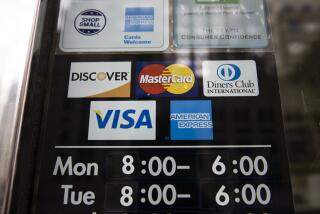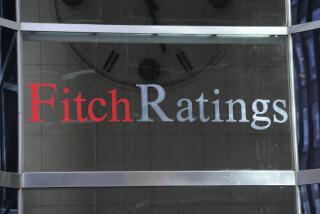Trade Deficit Makes U.S. a Net Debtor for 1st Time in 71 Years : ‘Sword Out There Hanging Over Us,’ Analyst Warns
- Share via
WASHINGTON — The United States suffered a record $117.7-billion deficit in the broadest measure of its foreign trade last year as the country became a net debtor for the first time in 71 years, the government reported today.
The Commerce Department reported that the deficit on the country’s current account for 1985 was 9.6% above the previous record deficit of $107.4 billion in 1984.
The current account is the broadest measure of the country’s international transactions because it measures not only trade in merchandise but also in services, mainly foreign investment flows between countries.
Surplus Until 1982
Up until 1982, the country enjoyed a surplus in the current account because American investment earnings overseas were enough to cover deficits in merchandise trade.
However, the country’s soaring trade deficits have swamped the small investment surpluses in recent years.
For 1985, the surplus in investment earnings totaled $21.4 billion, a slight improvement from 1984. But the merchandise trade deficit last year totaled $124.3 billion, an 8.9% increase over that for 1984.
The soaring merchandise trade deficit and $14.8 billion in transfer payments such as foreign aid swamped the $21.4-billion investment surplus to give the country the $117.7-billion current account deficit for the year.
First Time Since 1914
This big deficit wiped out the small $28.2-billion surplus America had at the end of 1984 in its overseas investments, pushing the country into the status of net debtor for the first time since 1914.
Simply stated, that means that foreigners owned more U.S. investments than Americans own in foreign investments.
Some economists have warned that the country’s foreign debt could rise to $400 billion before it begins to taper off. But analysts are divided over how serious a problem this is for the U.S. economy.
Reagan Not Alarmed
President Reagan has contended that the country’s status as a net debtor is not a cause for alarm but should be taken as a vote of confidence in the American economy. He has argued that it shows that “we are the best and safest investment in the world.”
But many private economists have argued that with the United States now in hock to the rest of the world, this country’s standard of living will be depressed as more U.S. capital flows into foreign hands to service the debt burden. These analysts contend that the country is now in danger of being hostage to the whims of foreign investors.
“We will have to pay interest on this debt, and eventually foreigners may want their money back. It essentially puts a sword out there hanging over us,” said David Wyss, an economist at Data Resources Inc., a private forecasting firm.
More to Read
Inside the business of entertainment
The Wide Shot brings you news, analysis and insights on everything from streaming wars to production — and what it all means for the future.
You may occasionally receive promotional content from the Los Angeles Times.










